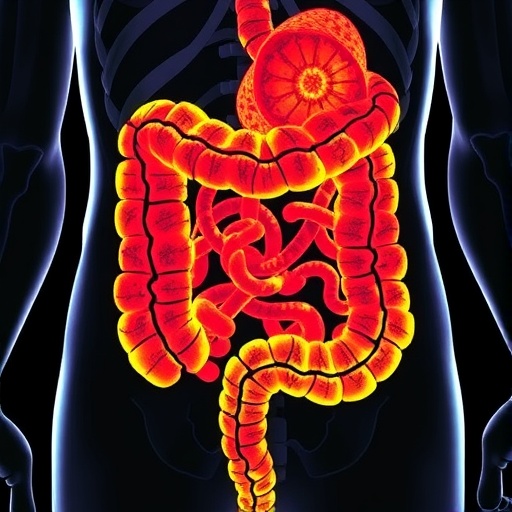In a groundbreaking study published in Clinical Proteomics, researchers led by Y. Luo, C. Xiao, and C. Zheng have unveiled a revolutionary approach to the early detection of colorectal precancerous lesions through an extensive investigation of the protein landscape. This meticulous research highlights the potential of protein biomarkers in diagnosing colorectal cancer at an earlier stage, which is critical for improving patient outcomes. The study underscores the importance of proteomics in understanding the molecular underpinnings of cancer progression, opening up avenues for new diagnostic tools that could significantly enhance clinical practices.
Colorectal cancer remains one of the leading causes of cancer-related deaths globally, challenging healthcare systems and illustrating the need for effective screening strategies. Early diagnosis is paramount in changing the prognosis for patients; thus, identifying reliable biomarkers could substantially improve survival rates. This study highlights how targeted proteomic analyses can be harnessed to unveil specific proteins associated with the onset of precancerous lesions, providing clinicians with invaluable information to inform treatment decisions.
By employing advanced proteomic techniques, the research team systematically identified and profiled a myriad of proteins present in colorectal tissue samples. The study utilized state-of-the-art mass spectrometry, enabling researchers to detect and quantify protein expression levels accurately. By comparing samples from healthy individuals to those with precancerous lesions, the researchers could pinpoint differential protein expressions that correlate with the onset of colorectal cancer, thereby laying the groundwork for potential biomarkers.
Importantly, the work digs deep into biological pathways affected during the early stages of colorectal cancer. Identifying these pathways not only sheds light on the molecular mechanisms contributing to cancer progression but also reveals potential targets for therapeutic intervention. By understanding how specific proteins are altered in precancerous lesions, researchers can develop strategies to reverse or inhibit these changes, potentially preventing cancer development altogether.
The authors highlight several key proteins that emerged as important players in this context. These proteins, often involved in critical cellular processes like apoptosis, cellular proliferation, and immune response, present exciting opportunities for further investigation. Their modulation could be crucial for the progression from benign lesions to malignant tumors, marking a pivotal step in colorectal carcinogenesis that warrants attention.
Moreover, the researchers emphasize the need for validation studies to confirm the clinical utility of these protein biomarkers. While their initial findings are promising, robust clinical trials are essential to determine how well these proteins perform in real-world screening scenarios. The path from research to clinical application is long but necessary to ensure that any newly identified markers offer tangible benefits to patients.
In light of the expanding knowledge of proteomics, this research serves as a reminder of the complexities of cancer biology and the necessity for interdisciplinary approaches to tackle such burdensome diseases. It evokes conversations about the future of cancer diagnostics, suggesting that proteomics could be an integral part of personalized medicine strategies. Tailoring surveillance and treatment strategies based on an individual’s unique protein expression profiles offers a glimpse of a more sophisticated and effective approach to cancer care.
Additionally, the significance of such research extends beyond colorectal cancer. Insights gained from understanding the protein landscape in colorectal precancerous lesions might be extrapolated to other forms of cancer, encouraging integrative research efforts across various oncological fields. This cross-disciplinary collaboration is vital for advancing our understanding of cancer biology and improving diagnostic and therapeutic modalities.
The study by Luo et al. reinforces the idea that early detection is possible through biochemical markers, changing the narrative around colorectal cancer screening. With the integration of innovative technologies and a deeper understanding of biological processes, healthcare providers could soon execute more effective screening protocols, potentially saving lives and reducing the burden of late-stage cancer diagnoses.
In conclusion, this pioneering research sets the stage for future investigations focused on protein biomarkers in colorectal cancer. The potential for integrating these findings into clinical practice holds great promise, suggesting that the next decade could usher in a new era of cancer detection through molecular profiling. As researchers continue to unlock the mysteries of cancer biology through innovative approaches like proteomics, the hope for earlier and more accurate detection of colorectal precancerous lesions becomes increasingly attainable.
Strong advocacy for further studies and validation of these protein biomarkers is essential. The journey from bench to bedside is one fraught with challenges, yet the rewards—early detection, improved treatment options, and ultimately, better survival rates—are well worth the effort. This study highlights that while the science behind cancer diagnostics is evolving, the fundamental goal remains the same: to catch cancer before it poses a life-threatening risk to patients.
This groundbreaking work emphasizes the need for continued investment in research and technology to further enhance our understanding of colorectal cancer. By embracing this evolving proteomic landscape, we may be on the cusp of transformative advancements in cancer detection and treatment. The convergence of science, technology, and patient care could redefine how we approach one of the most common and consequential diseases of our time.
As these researchers continue their quest for knowledge, the broader scientific community and society must rally around this cause. Opportunities for change are not just theoretical; they present real possibilities aligned with the vital needs of public health. Moving forward, the emphasis must be placed not only on discovering new biomarkers but also on overcoming obstacles that may hinder their adoption into standard medical practice. The implications of success are profound, potentially leading to a paradigm shift in the fight against colorectal cancer.
Subject of Research: Colorectal cancer detection through protein biomarkers.
Article Title: Unveiling the protein landscape for early detection of colorectal precancerous lesions.
Article References:
Luo, Y., Xiao, C., Zheng, C. et al. Unveiling the protein landscape for early detection of colorectal precancerous lesions. Clin Proteom 22, 27 (2025). https://doi.org/10.1186/s12014-025-09552-6
Image Credits: AI Generated
DOI:
Keywords: Colorectal cancer, proteomics, biomarkers, early detection, precancerous lesions.




